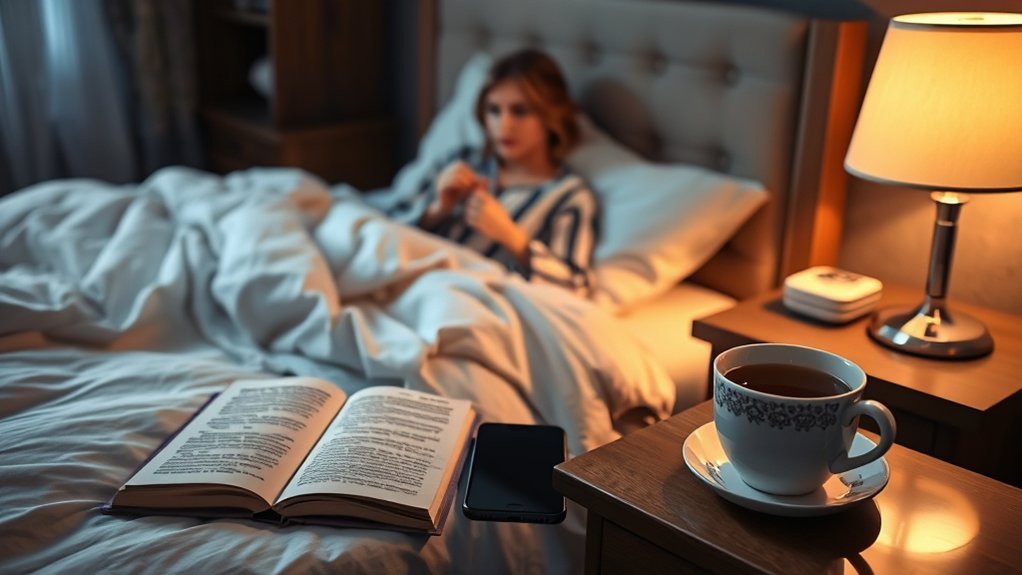As you wind down your day, it’s crucial to create an evening routine that truly supports your well-being. Making small adjustments can greatly impact your sleep quality and overall mood. You’ll want to reflect on how your choices in the evening can either help or hinder your relaxation. So, what are the best practices to adopt, and which habits should you avoid to guarantee a peaceful night? Let’s explore the do’s and don’ts together.
Creating a Calming Atmosphere
How can you transform your space into a calming haven? Start by decluttering your surroundings. A tidy space promotes clarity and peace of mind.
Next, consider soft lighting; warm lamps or candles can create a soothing atmosphere. Incorporate calming scents, like lavender or chamomile, using essential oils or incense to further enhance relaxation.
Soft lighting and calming scents transform your space into a soothing retreat, perfect for enhancing relaxation and peace.
You might also want to add some greenery; houseplants can purify the air and bring a touch of nature indoors. Choose calming colors for your decor—soft blues, greens, or neutrals can work wonders.
Finally, create a cozy corner with comfortable cushions or a blanket where you can unwind. By making these small adjustments, you’ll cultivate a peaceful environment that nurtures your well-being and helps you decompress after a long day.
Establishing a Consistent Sleep Schedule
While it might be tempting to stay up late and sleep in on weekends, establishing a consistent sleep schedule is essential for your overall well-being.
When you go to bed and wake up at the same time every day, your body’s internal clock gets regulated. This can lead to improved sleep quality, enhanced mood, and increased productivity.
Start small by setting a regular bedtime and gradually adjusting it if needed. Avoid drastic changes; consistency is key.
Remember, it’s not just about the hours you sleep, but also about the rhythm you create. You’ll likely find that sticking to a schedule makes it easier to fall asleep and feel refreshed each morning.
Embrace this routine, and your body will thank you!
Engaging in Relaxation Techniques
As you wind down for the evening, engaging in relaxation techniques can greatly enhance your shift into sleep.
Consider practicing deep breathing exercises; they help calm your mind and release tension. You might also try gentle stretching or yoga to ease physical discomfort and promote relaxation.
Meditation is another powerful tool; even a few minutes of mindfulness can ground you, creating a peaceful mindset for sleep.
Listening to soothing music or nature sounds can further enhance your atmosphere, making it feel serene.
Limiting Screen Time Before Bed
After incorporating relaxation techniques into your evening routine, it’s important to contemplate the impact of screen time on your ability to unwind.
You mightn’t realize how much your devices can interfere with your sleep. The blue light emitted by screens can disrupt your body’s natural circadian rhythm, making it harder to fall asleep.
Try setting a screen curfew for at least an hour before bedtime. Instead of scrolling through social media or binge-watching shows, consider reading a book or journaling. This shift can create a calmer atmosphere, helping your mind move into sleep mode.
Avoiding Heavy Meals and Stimulants
To guarantee a restful night’s sleep, it’s essential to steer clear of heavy meals and stimulants in the hours leading up to bedtime. Eating a large meal too close to bedtime can cause discomfort and indigestion, making it harder for you to drift off.
Instead, opt for light snacks if you’re hungry, like yogurt or a small piece of fruit.
Stimulants, such as caffeine and nicotine, can also disrupt your sleep cycle. It’s best to avoid coffee, tea, or energy drinks in the late afternoon and evening.
Frequently Asked Questions
How Long Should My Evening Routine Be for Effectiveness?
Your evening routine should ideally last between 30 to 60 minutes. This timeframe helps you unwind, reflect, and prepare for sleep. Consistency is key, so find what works best for you and stick with it!
Can I Incorporate Family Time Into My Evening Routine?
Absolutely, you can incorporate family time into your evening routine! It strengthens bonds and fosters connection. Just set aside a specific time for shared activities, like dinner or games, and enjoy those moments together.
What Activities Should I Avoid Before Bedtime?
Before bedtime, avoid screens, caffeine, and intense workouts. They mess with your sleep cycle. Instead, unwind with calming activities like reading or gentle stretching, creating a peaceful atmosphere that helps you recharge for tomorrow.
How Does Journaling Fit Into an Evening Routine?
Journaling helps you unwind and reflect on your day. It clears your mind, reduces stress, and prepares you for restful sleep. Just a few minutes can make a significant difference in how you feel.
Is It Beneficial to Prepare for the Next Day at Night?
Picture yourself waking up to a calm morning, knowing you’ve prepped the night before. Organizing your tasks and laying out clothes helps you feel focused, reducing morning stress and setting a positive tone for the day.
Conclusion
By prioritizing a calming evening routine, you can greatly improve your sleep quality and overall well-being. Did you know that studies show 70% of adults struggle with sleep at least once a month? You’re not alone in this! By creating a soothing atmosphere, sticking to a regular sleep schedule, and incorporating relaxation techniques, you can reclaim your nights. Remember, small changes can lead to big improvements—so start tonight and give yourself the restful sleep you deserve!
